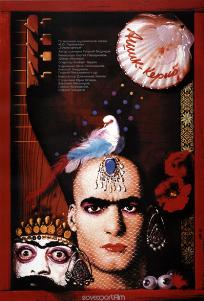Ashik Kerib (film): Difference between revisions
Rescuing 1 sources and tagging 0 as dead. #IABot (v1.2.5) |
|||
| Line 54: | Line 54: | ||
==External links== |
==External links== |
||
*{{imdb title|0094681|Ashik Kerib}} |
*{{imdb title|0094681|Ashik Kerib}} |
||
*[http://www.dvdbeaver.com/film/dvdcompare/ashik.htm DVDBeaver - comparison of DVD versions (Kino Video vs. Ruscico)] |
*[https://web.archive.org/web/20070109232507/http://www.dvdbeaver.com:80/film/dvdcompare/ashik.htm DVDBeaver - comparison of DVD versions (Kino Video vs. Ruscico)] |
||
*[http://www.parajanov.com/ashikkerib.html ''Ashik Kerib'' at Parajanov.com] |
*[http://www.parajanov.com/ashikkerib.html ''Ashik Kerib'' at Parajanov.com] |
||
Revision as of 14:27, 19 October 2016
| Ashik Kerib | |
|---|---|
 original Russian film poster | |
| Directed by | Dodo Abashidze Sergei Parajanov |
| Screenplay by | Gia Badridze |
| Starring | Yuri Mgoyan Sofiko Chiaureli Ramaz Chkhikvadze Konstantin Stepankov |
| Cinematography | Albert Yavuryan |
| Music by | Javanshir Guliyev |
Release date | 1988 |
Running time | 73 min |
| Countries | Soviet Union (Georgian SSR, Azerbaijan SSR) |
| Language | Georgian/Azerbaijani |
Ashik Kerib (Georgian: აშიკ-ქერიბი) (literally, "the strange lover") is a 1988 film by the Soviet- Georgian and Armenian filmmakers Dodo Abashidze and Sergei Parajanov based on the short story of the same name by Mikhail Lermontov. It was Parajanov's last completed film and was dedicated to his close friend Andrei Tarkovsky, who had died two years previously. The film also features a detailed portrayal of Azerbaijani culture.
Plot
Poor Ashik Kerib plays the Bağlama at weddings and other celebrations. He falls in love with Magul-Megeri who is a daughter of a rich man but her father opposes since Ashik Kerib is poor and he expects rich prospects for his 'daughter from heaven'. Ashik Kerib vows to wander for seven years to get rich or die.
A rival steals clothes from Ashik Kerib. Others think that Ashik Kerib drowned. Ashik Kerib's mother loses her vision from the tears that she cried. His rival persistently tries to get Magul Maher's hand in marriage.
The poor musician goes to the Sultan and sings about his love. The Sultan really enjoys his song and bestows gold to Ashik Kerib. For seven years he lives in abundance and almost forgets his bride.
After a wonderful meeting with a mysterious rider on a white horse Ashik Kerib is able to fulfill every wish with the help of a magical means. He moves to his native village and finds himself at the wedding of his beloved who was taken away, and the man guilty of the past misfortunes.
In the house of the rich man he is ridiculed because people find out that Ashik Kerib assures his listeners that he has made his long journey in a blink of an eye which usually takes more than a day.
The furious bride threatens to kill Ashik Kerib. To prove the veracity of his words he requests to bring his blind mother to the wedding feast. The heartbroken woman who is convinced of her son's death is brought into the room where the guests gathered. Ashik Kerib rubs his mother's unseeing eyes with a white handkerchief and returns her vision.
The shamed opponent runs away and Ashik Kerib celebrates his victory clad in white and prepares for the wedding with his newfound lover.
Style
The entire story is told in a way of Azerbaijan folklore with music and colour playing a key role. Dialogue is minimal and scripts are used to narrate the plot changes. The director included intentional anachronisms such as the use of submachine guns and a movie camera.
Themes
Parajanov's previous three major films were colourful illustrations of Ukrainian, Armenian and Georgian culture. Ashik Kerib similarly explores traditional Azerbaijani clothes, music, dance, art and customs.
Awards
- 1988 — Felix Award: Presented to the artists Georgi Aleksi-Meskhishvili, Niko Zandukeli and Shota Gogolashvili.
- 1989 — Istanbul International Film Festival: Special Prize of the Jury (to Sergei Parajanov)
- 1990 — Nika Award:
- Best Live-action Film and Best Director (both to Dodo Abashidze & Sergei Parajanov)
- Best Cinematography (to Albert Yavuryan)
- Best Production Designer (to Sergei Parajanov)
